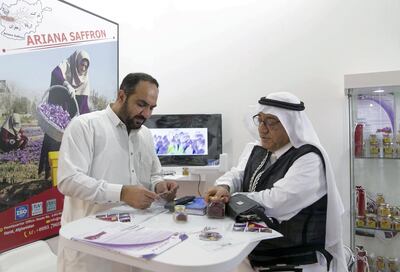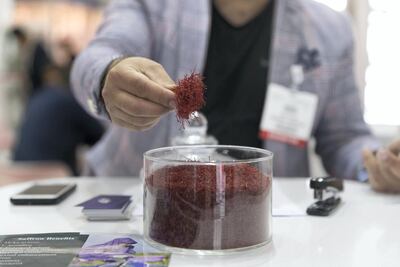Poppy fields across Afghanistan are slowly being replaced by pomegranate plantations as incentives offered to farmers to replace their illegal crops is turning around the war on drugs.
Some of those farmers are visiting Dubai this week for Gulfood, the world’s biggest food exhibition, to bring their produce to new markets.
Winning the war on drugs is seen as the key to winning the war on terror, with sources inside Afghanistan claiming the Taliban war machine is fuelled by $400 million every year.
“The agricultural sector is the backbone of our economy and it is playing a vital role in our nation’s development, but there some serious challenges,” said Nasir Durrani, agricultural minister of Afghanistan.
______________
Gulfood 2018
What you can expect to eat at Gulfood in Dubai
WATCH: Camel milk's new winning formula?
______________
“Insecurity in our country has fed the growth of the poppy and it is why farmers have been growing it for international markets.
“We have to find alternatives for these farmers that provide a product of equal or greater value, and we are beginning to do that.”
Afghanistan produces 90 per cent of the world’s poppy-produced heroin supply, placing it firmly in the eye of the storm. That is beginning to change.
The industry employs about 3 million Afghans, but new incentives encouraging farmers to switch to crops like saffron, pomegranate and nuts are helping change the agricultural landscape.
Trade routes are opening up for Afghan farmers, who are being offered grants to match their own investments to help set up new farms to cultivate legal crops.
Previous challenges of standardisation and achieving international quality benchmarks are being overcome with poppy farmers educated on the potential of other crops.
A hectare of grapes can yield about US$11,000, whereas a poppy farmer can expect to earn just US$4,500 from his illegal crops, and also face the risk of having his plantation destroyed by government enforcers.
The country’s climate and soil provides the perfect combination to encourage organic farming, with pesticide-free produce commanding a 30 per cent higher fee in the market than regular crops.
“No country in the world has the climate and soil quality to be able to grow the quality of produce that Afghanistan is able to farm, it has a naturally organic environment,” Mr Durrani said.
“The Taliban cannot stop us, and will not stand in our way of improving the infrastructure of Afghanistan.
“There are safe routes for farmers to be able to grow their crops freely, and move it out of the country to sell to new markets.”
In 2017, the US AID funded Commercial Horticulture and Agriculture Marketing Program helped Afghanistan export 30,000 metric tonnes of its home grown produce.
Exports of fresh and dried fruits, nuts and spices have almost doubled since 2014 as more farms and orchards that lay dormant during conflict are resurrected.
______________
Read more:
Afghan suicide attacks killed record numbers in 2017
Afghanistan Taliban 'want to solve war through dialogue'
More visitors at Dubai World Trade Centre
_______________
Mahmoud Mahmoud has pomegranate farms and production plants producing 300,000 tonnes of fruit in Kandahar and Kabul and is hoping to attract new business partners at Gulfood.
“My family built this business 25 years ago, but the war made it very difficult for us to grow,” he said.
“Farmers in the country are now achieving international standards and that is helping us to be more competitive.
“Pomegranate is more expensive than poppies now, and farmers are beginning to understand this.”
A shortage of refrigeration plants and cold storage to preserve pomegranates makes it difficult to preserve the fruits through the intense heat of summer.
New investment from foreign aid is helping to improve that to increase the shelf life of pomegranates grown in Afghanistan.
“Those farmers who have been making money through poppies are changing their crops, they see a future now and know the government will not burn their farms,” Mr Mahmoud said.
“Before, the poppy was their only option but that is very different now with new international markets.”
This month, Champ launched the Almaty trade office in Kazakhstan, offering a new gateway for Afghan products.
Rahma Tullah is taking over his father’s business in Herat City, growing saffron from the family’s 150-hectare farm to export to the US and GCC.
“Organic saffron can command 30 per cent more on the open market than regular saffron, so there is a big incentive for farmers to achieve this certificate,” he said.
“We want to set up a special cargo plane from Afghanistan to Dubai, as it is the gateway to trade in the region and that would be very important for us to grow.”




